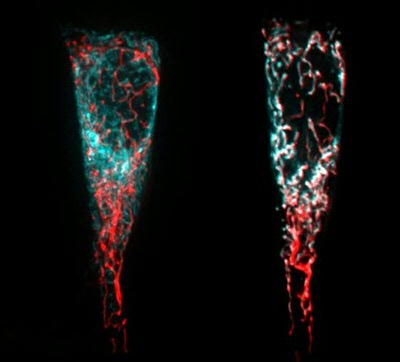The role of SK channels at the mitochondrial-ER contact points in neurodegenerative diseases
Investigators involved: Amalia Dolga, Inge Krabbendam
Progressive neurodegenerative diseases, including Alzheimer's or Parkinson's disease afflict millions of people worldwide and are characterized by a progressive loss of neuronal function in specific brain regions involved in learning, memory and/or motor coordination. The therapeutic possibilities for many patients, however, are limited and there is no causal therapy yet available. To address this unmet clinical need, new therapies are urgently required. As mitochondrial/ER dysfunction and inflammation are responsible for the initiation and progression of the neuropathology, proteins that prevent deregulation of both pathways are considered as drug targets.

Our research focus is on studying the molecular mechanisms underlying neurodegenerative diseases, in particular how mitochondrial dysfunction and inflammation contribute to neuronal cell death, therefore to neurodegenerative conditions. Potential therapeutic approaches may benefit from modulation of small-conductance calcium-activated potassium (SK) channels, since recent data supports the hypothesis that SK channel activity promotes neuronal survival against cellular stress via a dual mechanism of action: i) by controlling neuronal excitability, and ii) by preventing mitochondrial dysfunction and inflammation. Our laboratory aims at identifying the molecular mechanisms responsible for SK channels role in cell death and at elucidating their involvement in human diseases. To this goal, we combine experimental strategies with focused pharmacology, drug discovery platforms, genetics, biochemistry, and physiological studies of mitochondria and inflammation.
Relevant literature:
Activation of SK2 channels preserves ER Ca2+ homeostasis and protects against ER stress-induced cell death. Richter M, Vidovic N, Honrath B, Mahavadi P, Dodel R, Dolga AM, Culmsee C, Cell Death Diff. 2016 May;23(5):814-27.
SK channel activation modulates mitochondrial respiration and attenuates neuronal HT-22 cell damage induced by H2O2. Richter M, Nickel C, Apel L, Kaas A, Dodel R, Culmsee C, Dolga AM. Neurochem Int. 2015 Feb;81:63-75.
Mitochondrial small conductance SK2 channels prevent glutamate-induced oxytosis and mitochondrial dysfunction. Dolga AM, Netter MF, Perocchi F, Doti N, Meissner L, Tobaben S, Grohm J, Zischka H, Plesnila N, Decher N, Culmsee C. J Biol Chem. 2013 Apr 12;288(15):10792-804.
